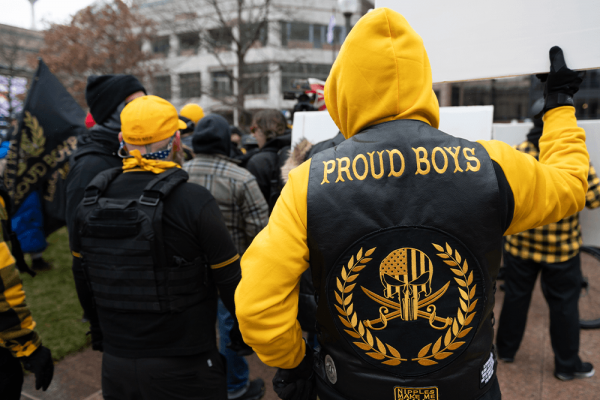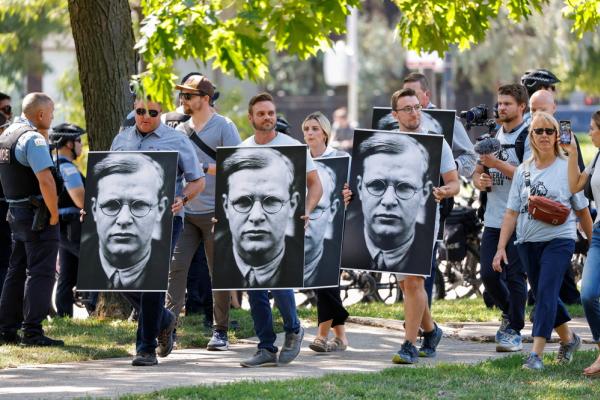The rise of Trump-fueled Christian nationalism in the U.S. is presenting a new version of an old conundrum for progressive Christians. The question "Are you a Christian?" — long complicated for progressive Christians, whose public outworkings of faith can sometimes bear little resemblance to more culturally-familiar conservative Christianity — has taken on new weight. "Yes!" we reply, quick to qualify: "…But not that kind."
Past presidents of both parties reached out to faith leaders of diverse backgrounds, even in times of great fear and confusion — consider President George W. Bush’s famous trip to a mosque after 9/11. But in his first year in office, Trump has gone full-bore Christian nationalist. His one religious advisory board is comprised exclusively of ultra-conservative evangelical Christians, who have continued to shock other denominations and faith traditions by their embrace of the alleged sexual assaulter in office.
And yet, amid a bigoted and greedy version of Christianity that currently dominates our public imagination, people continue to follow Jesus and to get involved in their local church — for some progressive Protestants, even more so than before.
These emerging Christian leaders say they are called to two ministries: serving the church, and resisting nationalism that invokes Christianity to oppress others.
I recently spoke with two newly-ordained ministers about what called them to ministry today, and how they are engaging in this dual calling of service and resistance.
"I feel deeply called to reject blasphemous hatred in Christ's own name,” Rev. Benjamin Perry, ordained as a teaching elder in the Presbyterian Church (U.S.A.) on Jan. 21, 2018, said.
“Every time I see those who ostensibly share my faith use the contours of Christianity to promote bigotry and violence, it makes me feel like running for the hills … but to flee would be to cede Jesus to those who would use him as a club.”
Rev. Alexis James Waggoner, ordained as a minister in the Christian Church (Disciples of Christ) on Feb. 23, 2018, shares a similar sentiment:
“There’s this feeling, I think especially for those of us who were raised in the conservative church, that everything we were raised on, everything we were taught about Jesus and God and being Christian was a huge, terrible lie. [But] I’m not just going to cede the name of Christian to [these] people.”
I met Revs. Perry and Waggoner through co-creating "The Resistance Prays," a daily newsletter consisting of a scriptural reflection and on one news story with a prayer and action designed to spiritually — and politically — defeat Trumpism. Both ministers say that for them, the newsletter is a proactive way to approach resistance, and fits into their ministry to others, and themselves.
"Honestly, it’s kind of selfish," Rev. Waggoner said. "When a terrible thing happens, [writing] gives me a sense of control over it, to be able to actually explicitly work through the reasons why it’s terrible — to see in black and white that yes, my faith does speak to this issue. …And it often provides me with confirmation that I should continue the work I’m doing."
For Rev. Perry, the biweekly exercise confirms his call to prophetic witness.
"People are looking for faith leaders to speak out, and far too many are silent. That silence gives moral cover to Trump's immoral agenda.”
As I spoke with Perry and Waggoner about ordination and ministry in the Trump years, I found new inspiration to continue my own forms of resistance. While Christian witness doesn't mean necessarily going into seminary, Waggoner and Perry have both found, in pastoral training, their voices for this time.
For both, the call to this point began long before a Trump presidency.
Waggoner says she got married “really young,” and soon began a long process with her husband of “breaking away" from their mutual semi-fundamentalist tradition.
"Almost ten years ago, as I was beginning to get deeper into the weeds on theology and really starting to deconstruct, my husband Ryan suggested I take a few classes at a seminary," Rev. Waggoner said. "The theology of our youth very much does not affirm my value and call as a woman in ministry. Having his support as I follow my path wherever it leads is hugely valuable to me."
Rev. Perry also mentioned the support of his partner in making the decision to pursue ministry.
"My wife Erin stands out, in part because she's not particularly religious herself. She's steadfastly supported me throughout seminary… but she also made sure that I stayed true to myself. The ordination process can try to shape you into being a different kind of minister than you feel God calling you to be, someone who will fit into a more conventional image of 'church,' and she's really helped me avoid those pitfalls."
Despite love and support, the choice to seek ordination in a time of deep internal divisions in American Christianity can be a lonely road.
For hope, Rev. Perry said he looks to the immortal words of another Presbyterian: Mr. Rogers.
"I always think of Mr. Rogers' advice: 'Look for the helpers,’” Perry said. “It's so easy to become hopeless in a world mired in hate, but forming deep connection with others in resistance helps stave off despondency. It's also an important reminder of what it means to be human. The love I see in those who stand by immigrants, who organize with the poor, who speak out against bigotry — that's true humanity.”
Rev. Waggoner agrees.
"Figuring out ways to tackle the despair and pain and suffering that so many feel right now, that’s life-giving to me,” Waggoner said.
“I find a lot of hope in that — that the resistance is more than a few marches or letter-writing campaigns. We are now a movement, and I don’t think we can be stopped.”
Got something to say about what you're reading? We value your feedback!







